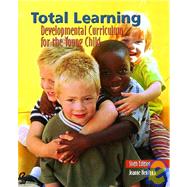
I. BUILDING A SECURE FOUNDATION FOR LEARNING
II. PLANNING FOR TOTAL LEARNING.
III. HELPING YOUNG CHILDREN RELISH LIFE AND DEVELOP HEALTHY BODIES.
IV. FOSTERING EMOTIONAL HEALTH IN YOUNG CHILDREN.
V. DEVELOPING SOCIAL COMPETENCE AND HEALTHY SELF-IDENTITIES.
VI. ENCOURAGING CHILDREN TO BE CREATIVE.
VII. FOSTERING THE USE OF LANGUAGE.
VIII. HELPING CHILDREN LEARN TO THINK FOR THEMSELVES.
The New copy of this book will include any supplemental materials advertised. Please check the title of the book to determine if it should include any access cards, study guides, lab manuals, CDs, etc.
The Used, Rental and eBook copies of this book are not guaranteed to include any supplemental materials. Typically, only the book itself is included. This is true even if the title states it includes any access cards, study guides, lab manuals, CDs, etc.